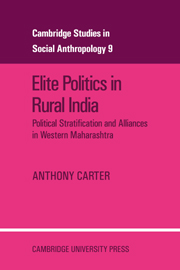 Elite Politics in Rural India
Elite Politics in Rural India from Part 3 - Political alliances
Published online by Cambridge University Press: 02 March 2010
SUMMARY
An alliance in the sense in which I have used the term here is a kind of exchange or transaction involving decisions to extend or withhold support or patronage. In both its transactional and its decision-making aspects it is a feature of what Firth and Barth call social organization. Regarded in this light, I argue, it becomes apparent that there is a simple pattern underlying the seeming patternlessness of political alliances in rural Western Maharashtra. This pattern consists not in irrational personal antagonisms attributable to the personality characteristics of Indian politicians (cf. Brass 1965:168–82), but rather in the relations between political action and certain antecedent structural frameworks.
The governmental and administrative institutions of Western Maharashtra comprise one such major antecedent structural framework. These institutions are the arenas within which political alliances are made. They determine many of the rules and provide many of the rewards for successful political strategy.
An analysis of the personnel who hold office in these institutions suggests that there is a small political class with privileged access to positions of influence. The political class is composed primarily of v∂t∂ndar Marathas with the addition of Brahmins and Jains in the towns. The existence of this privileged political class is the second major antecedent structural framework.
All of the groups in the political class have high caste status. The v∂t∂ndar Marathas also have numerical dominance in most villages of the region and they are found in substantial numbers in the market towns as well.
To save this book to your Kindle, first ensure no-reply@cambridge.org is added to your Approved Personal Document E-mail List under your Personal Document Settings on the Manage Your Content and Devices page of your Amazon account. Then enter the ‘name’ part of your Kindle email address below. Find out more about saving to your Kindle.
Note you can select to save to either the @free.kindle.com or @kindle.com variations. ‘@free.kindle.com’ emails are free but can only be saved to your device when it is connected to wi-fi. ‘@kindle.com’ emails can be delivered even when you are not connected to wi-fi, but note that service fees apply.
Find out more about the Kindle Personal Document Service.
To save content items to your account, please confirm that you agree to abide by our usage policies. If this is the first time you use this feature, you will be asked to authorise Cambridge Core to connect with your account. Find out more about saving content to Dropbox.
To save content items to your account, please confirm that you agree to abide by our usage policies. If this is the first time you use this feature, you will be asked to authorise Cambridge Core to connect with your account. Find out more about saving content to Google Drive.